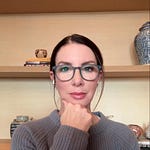[This blog will always be free to read, but it’s also how I pay my bills. So, if you like what you read, please consider a paid subscription. And yes, I do speaking engagements.]
I often feel old these days, though I know I’m not.
I’m only 36, but don’t try telling my body that. My back is often sore. My joints move like caramel popcorn being squeezed. I’ve reached the point in my life—probably earlier than what’s healthy—in which, occasionally, taking a few ibuprofen has become an anticipatory action.
But I have noticed—though I don’t want to speak for anyone else here—that the most compelling proof I’m getting older is in watching those who built the world of my childhood pass on.
There is something about that time, coming-of-age, the latter part of early childhood to adolescence, in which reality is simultaneously being crystallized and suspended, brought into sharper clarity but not-so-threatening. In youth, we experience the peak of a mindset in which the consequences of our actions seem highly plausible but still somehow unlikely.
(By the way, this is one of the many reasons I do not wish to be a parent: I have, thus far, failed to fully grasp the careful art of understanding consequence without allowing it to hold me back in necessary moments, and I can’t imagine being qualified to teach a child this essential life skill. Hats off to you parents who are capably doing so.)
As a child, I understood death and appropriately feared it to a degree. I understood that I could die. Of course I could die. I was a little shit effortlessly rendered helpless and swelling by a random bee sting. My mortality was not up for debate in my own mind.
My failure as a child was understanding the mortality of others and the ensuing paradox that arose from that (again, in my own mind). Yes, I could die, but these adults in my life were much stronger and somehow less likely to die. When I was nine years old—and I think this is true for the vast majority of people—even the thought of making it to thirty felt on par with traveling to the Moon.
Plausible, I guess, but justifiably too far away to put much thought into it.
Because that perception of time is so cavernous, it felt like the reasonably healthy adults in my life might live forever. They would not, and I knew this, of course. But for a small part of me, it felt that way, and so long as they were perceived to be in relatively good health, there was no reason to adjust that perception.
They had already traveled to the Moon. Who was I, with more fingers than years, to say they ever needed to stop traveling?
I remember exactly where I was when Robin Williams died. I was sitting at a seafood restaurant’s outdoor section in Bar Harbor, Maine. I was on a vacation with my ex-girlfriend. It had been a pleasant trip, full of fun and adventure. She had left to use the restroom, and I sat there at the table, briefly alone, basking in the comfort of our gorgeous surroundings.
My phone buzzed, I picked it up, and the notification ruthlessly glared back at me. I don’t remember if it was CNN or NYT or whatever, but my brain, refusing to accept it, quickly decided a sick joke was being played. A particularly successful hoax had been perpetrated. There was absolutely no way Robin Williams was dead. Impossible.
I searched around and read what you might read in a few minutes from reputable sources, too many outlets with too many details for it to be wrong. I don’t remember when she came back to the table, but at some point, she was again seated across from me and asking if I was okay.
I recall looking up at her, not sure how to say it, and realized that most of these other folks seated around us probably hadn’t heard the news yet, either. And I really, truly envied them.
Robin Williams’ death was the first time my brain seemingly wouldn’t accept new information. It was the strangest damn thing. For six or seven months, I would occasionally forget he died and then be reminded and feel a bit shocked all over again, embarrassed by my unintentional childishness.
If you grew up in the ‘90s, Robin Williams was Genie and Jack and Peter Pan and Prof. Brainard and Patch Adams and, hell, for those of us staying up way later than we should have been, we knew him as Mork on Nick-at-Nite, too.
He was the Ultimate Fun Uncle to millennials, and yes, we knew he was mortal, but that was still no excuse to defy our childish expectations that he live forever. Someone as special as Robin Williams isn’t supposed to die—not just early but at all—even though we know that’s completely irrational.
When Sinead O’Connor and Paul Reuben died within a week of each other, I wrote a small note of condolence for Gen-X on Twitter, believing that most of the folks of that generation were experiencing a bit too many reminders of our collective mortality in such a short span of time. When the celebrities that defined your youth die, it hurts a little more than usual.
I don’t believe every person of a certain age experiences this the same way, nor do I believe any person outside a particular generation isn’t just as hurt by a particular person’s death, if not moreso.
But I do believe in generational grief, a specific type of pain that comes with notable deaths of those adults we revered in childhood. In fact, reverence isn’t even required. Even the reminder of that person’s presence in the world when you were a kid is enough to be poked in the side by Death’s hand and told: someday, it will be you.
I have never been good at grieving. I’m not even sure what “good” looks like. My mother died three years ago, and I would be lying if I said that I’ve moved past it. I know I haven’t, and worst yet, I’m not sure how it would look to do so.
In the time since, with the goal of better understanding it all, I have written something like 20,000 words about our relationship, which was quite unhealthy, to put it mildly. Sometimes, I think about publishing an essay on her and quickly throw away the idea. I wonder who needs to read it, and if no one, then aren’t I just writing it for myself? And if so, who else needs to read it?
I say again, I have never been good at grieving, whatever that’s supposed to be.
Along with most of my friends, who are around my age, I am entering a period of my life in which death, unexpected and otherwise, is increasingly becoming a far more prominent feature of living. In the past several years, alone, I have lost several friends and even more colleagues.
That’s life, I know. That’s how it works. Grief, I guess, is the active process of feeling what needs to be felt, whatever that may be, with the hopeful goal of getting back to active living.
Much easier said than done.
In the meantime, I’m trying to be more grateful for the people in my life now who make it worth living, those who hung the Moon in my sky while I’ve been too worried about missing it.
Hi, I’m Charlotte Clymer, and this is Charlotte’s Web Thoughts, my Substack. It’s completely free to access and read, but it’s also how my bills! So, please do kindly consider upgrading to a paid subscription: just $7/month or save money with the $70/annual sub. You can also go way above and beyond by becoming a Lifetime Member at $250.














Share this post